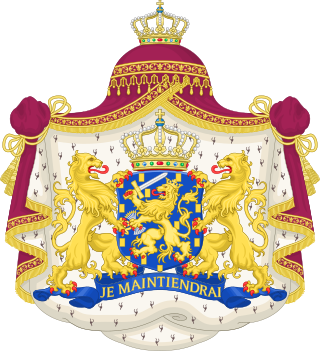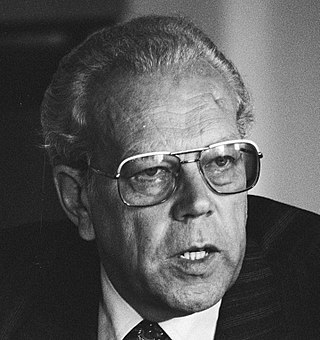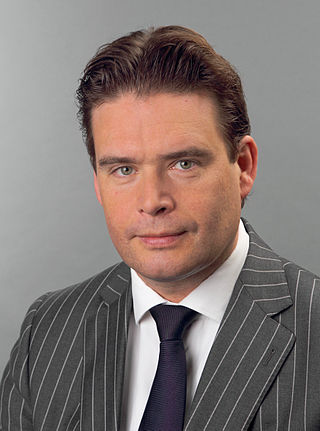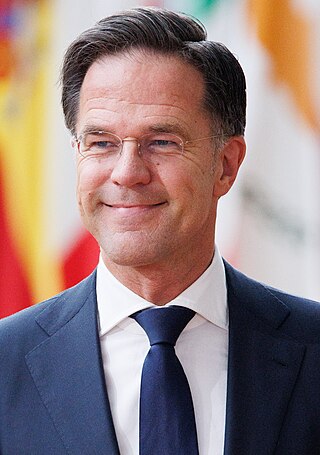
The foreign policy of the Netherlands is based on four basic commitments: to the Atlantic cooperation, to European integration, to international development and to international law. While historically the Kingdom of the Netherlands was a neutral state, since 1945 it has become a member of NATO, the United Nations, the European Union and many other international organizations. The Dutch economy is very open and relies on international trade. During and after the 17th century—its Golden Age—the Dutch built up a commercial and colonial empire. It was a leading shipping and naval power and was often at war with England, its main rival. Its main colonial holding was Indonesia, which fought for and achieved independence after 1945. The historical ties inherited from its colonial past still influence the foreign relations of the Netherlands. Foreign trade policy is handled by the European Union. The Dutch have been active in international peacekeeping roles.

Gerrit Zalm is a retired Dutch politician of the People's Party for Freedom and Democracy (VVD) and businessman.

The Ministry of Education, Culture and Science is the Dutch Ministry responsible for education, culture, science, research, gender equality and communications. The Ministry was created in 1918 as the Ministry of Education, Arts and Sciences and had several name changes before it became the Education, Culture and Science in 1994. The Ministry is headed by the Minister of Education, Culture and Science, currently Eppo Bruins.

The Ministry of Foreign Affairs is the Netherlands' ministry responsible for foreign relations, foreign policy, international development, international trade, diaspora and matters dealing with the European Union, NATO and the Benelux Union. The ministry was created in 1798, as the Department of Foreign Affairs of the Batavian Republic. In 1876, it became the Ministry of Foreign Affairs.

The Ministry of Defence is the Dutch ministry responsible for the armed forces of the Netherlands and veterans' affairs. The ministry was created in 1813 as the Ministry of War and in 1928 was combined with the Ministry of the Navy. After World War II in the ministries were separated again, in this period the Minister of War and Minister of the Navy were often the same person and the state secretary for the Navy was responsible for daily affairs of the Royal Netherlands Navy. In 1959 the ministries were merged once again. The ministry is headed by the Minister of Defence, currently Ruben Brekelmans, assisted by the Chief of the Defence, Onno Eichelsheim.

The Ministry of Finance is the Dutch Ministry responsible for economic policy, monetary policy, fiscal policy, tax policy, incomes policy, financial regulation, the government budget and the financial market. The Ministry was created in 1798 as the Department of Finance of the Batavian Republic. It became the Ministry of Finance in 1876. The Minister of Finance is the head of the Ministry and a member of the Cabinet of the Netherlands. The current Minister is Eelco Heinen.

The Tax and Customs Administration is the tax collection agency of the Kingdom of the Netherlands, operating under the Ministry of Finance. It's responsible for levying and collecting taxes, enforcing tax legislation, and investigating tax fraud.
Netherlands benefits from a strategic geographic location, a world-class economy, a stable political climate, and a skilled workforce. The Netherlands has a large network of tax treaties, a low corporate income tax rate and a full participation exemption for capital gains and profits. These characteristics, in addition to a favorable tax environment, make Netherlands one of the most open economies in the world for multinational corporations (MNCs).
Standard Business Reporting is a group of international programs instigated by a number of governments to reduce the regulatory burden for business. The concept is to make business the centre when it comes to managing business-to-government reporting obligations.* Businesses conduct their own financial administration; the facts they record and decisions they make should drive their reporting. The government should be able to receive and process this information without imposing undue constraints on how businesses administer their finances.

Willem Albeda was a Dutch politician of the defunct Anti-Revolutionary Party (ARP) and later of the Christian Democratic Appeal (CDA) party and economist.

Frans Hubertus Henricus Weekers is a Dutch politician of the People's Party for Freedom and Democracy (VVD) and lawyer.

Steven Peter Robert Albert Van Weyenberg is a Belgian-born Dutch politician of the social-liberal Democrats 66 (D66) party. He served on the House of Representatives and occupied several ministerial posts.

The Ministry of Finance is an Indonesian government ministry responsible for the nation's finance and state assets. The finance minister is responsible to the President. The ministry's motto is Nagara Dana Rakça, which means "guardian of state finance".

Wopke Bastiaan Hoekstra is a Dutch politician. He served as second Deputy Prime Minister of the Netherlands and Minister of Foreign Affairs in the fourth Rutte cabinet between 10 January 2022 and 1 September 2023. Hoekstra previously served as Minister of Finance in the third Rutte cabinet from 2017 to 2022 and Leader of the Christian Democratic Appeal (CDA) from 2020 to 2023. In 2023, he was nominated to take on the role of Frans Timmermans as EU Commissioner, being responsible for climate action. On the 22nd of July 2024 it was announced that Hoekstra is nominated for a new term of EU Commissioner on behalf of the Schoof cabinet.

Diplomatic relations exist between Azerbaijan and the Netherlands. Azerbaijan have an embassy in The Hague. the Netherlands has an embassy in Baku. Both countries are full members of the Council of Europe. Azerbaijan celebrated its 30th anniversary with the Netherlands on April 1, 2022.

Menno Snel is a Dutch politician. A member of the Democrats 66 (D66) party, he served as State Secretary for Finance from 26 October 2017 until his resignation on 18 December 2019.
In the Netherlands the Treasurer-General is the head of the General Treasury, part of the Ministry of Finance. The holder of the office has a deputy and is a member of the board of directors of the finance ministry.

The Ministry of Finance and Planning of Suriname is a government agency charged with the fiscal and financial implementation of government policies.

The Dutch childcare benefits scandal refers to a political scandal in the Netherlands involving false allegations of welfare fraud by the Tax and Customs Administration against thousands of families claiming childcare benefits.

The fourth Rutte cabinet was the cabinet of the Netherlands from 10 January 2022 until 2 July 2024. The cabinet was a continuation of the third Rutte cabinet and was formed by the conservative liberal People's Party for Freedom and Democracy (VVD), the social liberal Democrats 66 (D66) and the Christian democratic Christian Democratic Appeal (CDA) and Christian Union (CU) after the election of 2021. The cabinet fell on 7 July 2023, after failing to reach an agreement on separate treatment of refugees fleeing from war. It continued serving as a demissionary cabinet until the Schoof cabinet was sworn in on 2 July 2024.
















